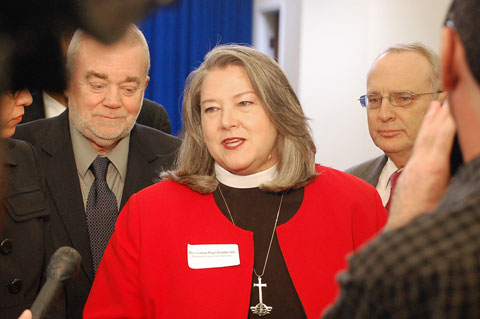
|
||||||||
| White House Focuses on Faith- Based Groups | |||||||
|
An "ambitious" 164-page report submitted to the White House this week on partnerships with faith-based organizations already is having an impact, says a United Methodist involved in the process. The more than 60 recommendations from the President's Advisory Council on Faith-based and Neighborhood Partnerships also have implications for United Methodists, added the Rev. Donald "Bud" Heckman, a United Methodist pastor who sat on the council's Inter-religious Cooperation Task Force. "This report has an overriding focus on those whom our Scriptures call ‘the least of these,'" he said. "There are several dozen recommendations that will mean changes in people's lives for the better. Some of them are big – like changing how we measure and treat poverty – and some of them small – specific techniques to bolster fatherhood and healthy families." The council was formed a year ago after President Obama announced he would maintain the White House office created by President George W. Bush to work with faith-based partners. Heckman, director for external relations of the New York-based Religions for Peace, credits the young staff of the new White House Office of Faith-Based and Neighborhood Partnerships for guiding the shape of the report, which was presented to the President on March 9. Joshua DuBois, a Pentecostal pastor and former campaign aide, and his deputy, Mara Vanderslice, gathered a broad array of people – including those representing federal agencies – to wrestle quietly with difficult questions and build consensus. A number of the recommendations already are being implemented because "there is enough agreement on all sides for that to go forward," Heckman said. Besides coordinating the advisory council, whose members serve one-year terms, the White House office forms partnerships between nonprofit organizations and all levels of government, including the centers "for faith-based and community initiatives" relating to 12 federal agencies. "The real genius of the Obama administration was to bring people together in task forces who disagreed with one another, people of different political stripes, religious backgrounds, even representative of diversity within religious communities," he explained. "This meant that we embodied the diversity of the American public in our very process with one another." ‘Respect and civility' In a posting on the White House Web site, DuBois lauded the consensus achieved by participants in the report. "We note with pride the respect and civility council and task force members have shown one another throughout this process, even as they worked to provide advice on some of the toughest issues we face as a nation," he wrote. The Inter-religious Cooperation Task Force began its work last spring, drafting and redrafting recommendations over the next months. Reports from it and the other five task forces – economic recovery and domestic poverty, environment and climate change, fatherhood and healthy families, global poverty and development and reform of White House office – were incorporated in the final report. Religions for Peace, recognized by The United Methodist Church as its outlet for interreligious relations, is using the report as a tool for international dialogue "about constructive and productive relationships between religious communities and governments," Heckman said. One important recommendation from the advisory council report is to update the current federal guidelines for measuring poverty, said the Rev. Peg Chemberlin, one of the 25 council members. A Moravian pastor, she is president of the National Council of Churches and executive director of the Minnesota Council of Churches. "Current federal guidelines for measuring poverty have not been updated since the 1960s and are woefully inadequate in helping assess levels of poverty in America today," Chemberlin wrote in a March 10 blog on the Huffington Post. "A new standard is needed." The advisory council urged President Obama to "utilize the knowledge, expertise and on-the-ground experience of local faith-based and community organizations to redefine the federal poverty guideline so it more accurately measures and responds to the needs of low-income people." America's churches are continuing to respond to the call to care for the poor, Chemberlin noted. "But without a means of accurately gauging the needs of our communities and the ability to direct federal resources where they can do the most good, millions will continue to go hungry, homeless and forgotten," she said. The full report can be found online at http://www.whitehouse.gov/sites/default/files/microsites/ofbnp-council-final-report.pdf. |
|
||||||
 |




